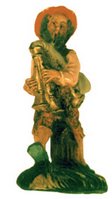Zampognari – Italian Christmas Bagpipes
written by David Anderson limited rights reserved ViewItaly.blogspot.com
 Bagpipes are from Scotland, aren’t they?
Bagpipes are from Scotland, aren’t they?We think of accordions, strolling minstrels playing their folkloristic melodies, all year round in traditional garb, but bagpipes are not one of the images that come to mind when thinking about Italian Christmas traditions. I was surprised to hear, early in the morning on a cold December day, bagpipes whining. Joyful tunes, playful melodies entered the courtyard just outside our home. Robust gentlemen, dressed in knickers and heavy wool capes, played their instruments. Shortly the courtyard was full of life as children appeared, pulling on their sweaters, as they exited their home. Windows popped open from the upper floors as the figures of the stoic Matriarchs watched attentively. The glimpse of a smile on their lips, they hummed songs of times past.
 It was the Immacolata, the day celebrating Maria, the soon to be mother of Christ. The songs praise the Madonna and announce the joyous events to come. The tradition is not Milanese, although the Zampognari are part of Christmas traditions throughout Italy. The origins seem to be both Sicilian and Roman. The stories differ in the individuals involved but the essence is the same. The shepherds play the bagpipes, as in Scotland the sheepherders made instruments from the materials available, so did the shepherds of Italy. Their lives spent long away from civilization, searching for green fields for their herds, rarely would they come to town. Christmas is a special occasion. A period where all return to their families and the shepherds would descend from the surrounding hills and pastures with their herds, playing their instruments, announcing their arrival for the holidays.
It was the Immacolata, the day celebrating Maria, the soon to be mother of Christ. The songs praise the Madonna and announce the joyous events to come. The tradition is not Milanese, although the Zampognari are part of Christmas traditions throughout Italy. The origins seem to be both Sicilian and Roman. The stories differ in the individuals involved but the essence is the same. The shepherds play the bagpipes, as in Scotland the sheepherders made instruments from the materials available, so did the shepherds of Italy. Their lives spent long away from civilization, searching for green fields for their herds, rarely would they come to town. Christmas is a special occasion. A period where all return to their families and the shepherds would descend from the surrounding hills and pastures with their herds, playing their instruments, announcing their arrival for the holidays. Shepherd pipers are originally from the mountain villages around Rome and from the Abruzzi region. Dressed in crisscrossed leather leggings, short bulky trousers that are buckled just below the knee, vests of sheepskin (unfortunately now often replaced by more “fashionable” synthetics), velvet jackets and peaked caps, these pipers are a contemporary link to the original shepherds that visited the child in the manger in Bethlehem.
Shepherd pipers are originally from the mountain villages around Rome and from the Abruzzi region. Dressed in crisscrossed leather leggings, short bulky trousers that are buckled just below the knee, vests of sheepskin (unfortunately now often replaced by more “fashionable” synthetics), velvet jackets and peaked caps, these pipers are a contemporary link to the original shepherds that visited the child in the manger in Bethlehem. The music is joyful. It is a time of reunion and of company. It means that Christmas will soon arrive. In northern Italy this tradition is primarily in the smaller towns, rarely seen in Milan. In Rome and most parts of Sicily, beginning with the 8th of December, the shepherds march the streets and squares, playing their bagpipes. They are prevalent and it is not unusual for crowds to gather and follow. Singing songs passed down through the generations. A type of Christmas Caroling, it signals the beginning of the holiday season.
The music is joyful. It is a time of reunion and of company. It means that Christmas will soon arrive. In northern Italy this tradition is primarily in the smaller towns, rarely seen in Milan. In Rome and most parts of Sicily, beginning with the 8th of December, the shepherds march the streets and squares, playing their bagpipes. They are prevalent and it is not unusual for crowds to gather and follow. Singing songs passed down through the generations. A type of Christmas Caroling, it signals the beginning of the holiday season.Tags: Bagpipes Italian Christmas Traditions Rome Christmas Rome Sicily Art and Culture Travel Italy
Labels: christmas, Holiday Traditions, Italian Holidays



2 Comments:
David: You didn't read my post carefully. I'm critical of Jacoby's argument. The data you're referring to -- 12 million illegals -- is Jacoby's estimate, citing the common number mentioned regularly in the media. Other estimates place the number of aliens in the U.S. much higher, as you suggest -- though nobody knows for sure how many are really here, including yourself. Also, I don't favor amnesty -- in fact, I find the idea repulsive -- but I doubt there'll be a revolution of we implement one. We can't realistically deport 12-to-20 illegal aliens from the country. I mention Jacoby's argument as realistic. That doesn't mean I agree with her, something you'd know if you'd spent any time thinking about what I've written on immigration, in the current post or any of those to which I link.
Burkean Reflections
6:11 AM
No, I do not know how many illegals there are but I can look at this from a past experience point of view. How many illegals did the govt say there were before the Regan Amnesty. How many were there in reality. Multiply the number (12 million) times the percentage they were wrong the last time (200%) and you get 25 million. I know people say it is different this time, but somehow things are always the same.
6:52 AM
Post a Comment
<< Home